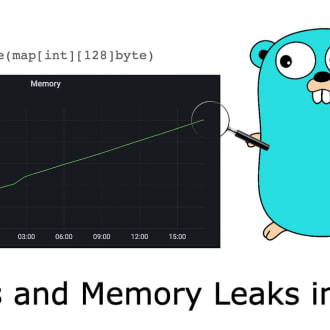
10+ Best Articles on Golang
The most useful articles on golang from around the web, curated by thought leaders and our community.
Refind focuses on timeless pieces and updates the list whenever new, must-read articles or videos are discovered.
Top 5 Golang Articles
At a glance: these are the articles that have been most read, shared, and saved on golang by Refind users in 2024 so far.
How to ...?
How to Combine two Programming Languages: A Ruby and Golang Tutorial
During past projects, I experienced difficulties when developing with a Ruby encryption pack.
How to write Go code and make it run on Adafruit Feather or Arduino
Getting started with TinyGo - a Go compiler for microcontrollers.
Short Articles
Short on time? Check out these useful short articles on golang—all under 10 minutes.
The Best Go framework: no framework?
While writing this blog and leading Go teams for a couple of years, the most common question I heard from beginners was “What framework should I use?”. One of the worst things you can do in Go is…
Making a Go program 42% faster with a one character change
2022-11-13 If you read the title and thought “well, you were probably just doing something silly beforehand”, you’re right! But what is programming if not an exercise in making silly mistakes?…
Maps and Memory Leaks in Go
A map can always grow in memory; it never shrinks. Hence, if it leads to some memory issues, you can try different options.
Interactive Go programming with Jupyter
Introduction of a new feature-rich golang Jupyter kernel
Long Articles
These are some of the most-read long-form articles on golang.
Rubbing control theory on the Go scheduler
How CockroachDB uses control theory, studies CPU scheduler latencies, builds forms of cooperative scheduling, and patches the Go runtime.
Server-side I/O Performance: Node vs. PHP vs. Java vs. Go
Clearly, Go is the winner here, followed by Java, Node and finally PHP.
Comparing Elixir and Go
Let's compare Elixir and Go by taking a look at their backgrounds, their programming styles, and how they deal with concurrency.
Go best practices, six years in
(This article was originally a talk at QCon London 2016. Video and slides here.) In 2014, I gave a talk at the inaugural GopherCon titled Best Practices in Production Environments. We were early…
Go 1.13 Release Notes
The latest Go release, version 1.13, arrives six months after Go 1.12. Most of its changes are in the implementation of the toolchain, runtime, and libraries. As always, the release maintains the Go 1…
What is Refind?
Every day Refind picks the most relevant links from around the web for you. Picking only a handful of links means focusing on what’s relevant and useful.
How does Refind curate?
It’s a mix of human and algorithmic curation, following a number of steps:
- We monitor 10k+ sources and 1k+ thought leaders on hundreds of topics—publications, blogs, news sites, newsletters, Substack, Medium, Twitter, etc.
- In addition, our users save links from around the web using our Save buttons and our extensions.
- Our algorithm processes 100k+ new links every day and uses external signals to find the most relevant ones, focusing on timeless pieces.
- Our community of active users gets the most relevant links every day, tailored to their interests. They provide feedback via implicit and explicit signals: open, read, listen, share, mark as read, read later, «More/less like this», etc.
- Our algorithm uses these internal signals to refine the selection.
- In addition, we have expert curators who manually curate niche topics.
The result: lists of the best and most useful articles on hundreds of topics.
How does Refind detect «timeless» pieces?
We focus on pieces with long shelf-lives—not news. We determine «timelessness» via a number of metrics, for example, the consumption pattern of links over time.
How many sources does Refind monitor?
We monitor 10k+ content sources on hundreds of topics—publications, blogs, news sites, newsletters, Substack, Medium, Twitter, etc.
Can I submit a link?
Indirectly, by using Refind and saving links from outside (e.g., via our extensions).
How can I report a problem?
When you’re logged-in, you can flag any link via the «More» (...) menu. You can also report problems via email to hello@refind.com
Who uses Refind?
450k+ smart people start their day with Refind. To learn something new. To get inspired. To move forward. Our apps have a 4.9/5 rating.
Is Refind free?
Yes, it’s free!
How can I sign up?
Head over to our homepage and sign up by email or with your Twitter or Google account.
Keep Learning
Get the big picture on your favorite topics.








